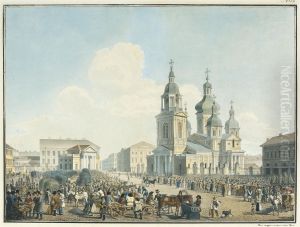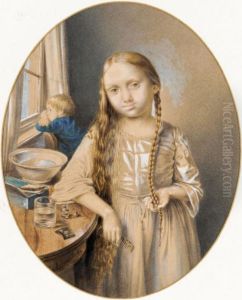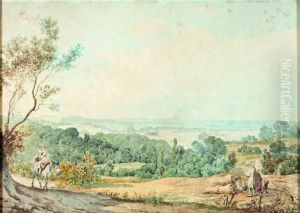Alexander Pavlovich Bruloff Paintings
Alexander Pavlovich Bruloff was a prominent Russian architect and painter, part of the famous Brulov (Brulloff) artistic family that left a significant mark on Russian art and architecture in the 19th century. Born on November 15, 1798, in St. Petersburg, Russia, he was the son of Paul Brulloff, an academician who taught at the Academy of Fine Arts in St. Petersburg, and the younger brother of Karl Bruloff, who is often considered one of the greatest painters of Russia.
Alexander Pavlovich showed an early talent for visual arts and followed in the footsteps of his father and brother by enrolling at the Imperial Academy of Arts in St. Petersburg. After completing his studies, he embarked on an extensive tour of Europe, which was a common practice among young artists of the time, to study classical and contemporary art. During his travels, he spent time in Italy, where he was influenced by the Italian Renaissance and Neoclassical styles, which would later be reflected in his architectural works.
Upon returning to Russia, Bruloff became a professor at the Imperial Academy of Arts and was involved in several significant architectural projects. He is best known for his role in designing and supervising the construction of the Great Kremlin Palace in Moscow, which was completed in the 1840s and served as a residence for the Tsars. His other notable works include the design of the Horse Guards Riding Hall in St. Petersburg and the Pulkovo Observatory, which was considered one of the world's best-equipped astronomical observatories of the time.
Bruloff also contributed to the design of several public buildings and private mansions, often blending classical elements with Russian architectural traditions. Despite being overshadowed by the artistic achievements of his brother Karl, Alexander Pavlovich Bruloff was a respected figure in his own right within the Russian art and architectural scene. His legacy includes a range of buildings that continue to be admired for their elegance and historical significance.
Alexander Pavlovich Bruloff passed away on January 9, 1877, in St. Petersburg. His death marked the end of an era for the Bruloff family's contributions to Russian culture, but his works remain a testament to his skill and vision as an architect.


